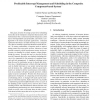Free Online Productivity Tools
i2Speak
i2Symbol
i2OCR
iTex2Img
iWeb2Print
iWeb2Shot
i2Type
iPdf2Split
iPdf2Merge
i2Bopomofo
i2Arabic
i2Style
i2Image
i2PDF
iLatex2Rtf
Sci2ools
RTSS
2008
IEEE
2008
IEEE
Predictable Interrupt Management and Scheduling in the Composite Component-Based System
This paper presents the design of user-level scheduling hierarchies in the Composite component-based system. The motivation for this is centered around the design of a system that is both dependable and predictable, and which is configurable to the needs of specific applications. Untrusted application developers can safely develop services and policies, that are isolated in protection domains outside the kernel. To ensure predictability, Composite needs to enforce timing control over user-space services. Moreover, it must provide a means by which asynchronous events, such as interrupts, are handled in a timely manner without jeopardizing the system. Towards this end, we describe the features of Composite that allow user-defined scheduling policies to be composed for the purposes of combined interrupt and task management. A significant challenge arises from the need to synchronize access to shared data structures (e.g., scheduling queues), without allowing untrusted code to disable...
Applied Computing | Asynchronous Event | Composite Component-based System | RTSS 2008 | User-level Scheduling Hierarchies |
| Added | 01 Jun 2010 |
| Updated | 01 Jun 2010 |
| Type | Conference |
| Year | 2008 |
| Where | RTSS |
| Authors | Gabriel Parmer, Richard West |
Comments (0)

